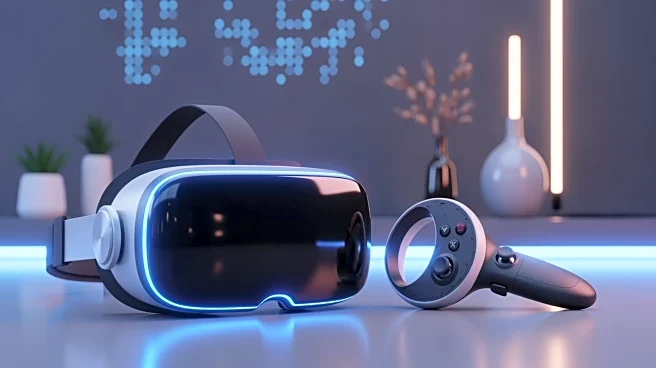What's Happening?
Valve is reportedly set to announce new hardware, including the Steam Frame VR headset and a new Steam Controller, as early as November 12, 2025. The Steam Frame VR headset, previously codenamed 'Deckard,'
is expected to feature advanced specifications such as a Snapdragon 8 Gen 3 CPU and a 2160x2160 display at 120 Hz. The headset will introduce 'Frames,' visual elements that enhance user interaction with applications. The new Steam Controller is rumored to include a capsense feature for detecting hand proximity, enhancing comfort and immersion. The announcement may coincide with the reveal of the HLX project, potentially Half-Life 3.
Why It's Important?
The potential announcement of the Steam Frame VR headset and new Steam Controller marks a significant advancement in Valve's VR technology. The introduction of 'Frames' could revolutionize user interaction in virtual environments, offering a more immersive experience. The new hardware may attract both consumers and developers, driving innovation in VR applications and gaming. Additionally, the rumored reveal of Half-Life 3 could generate substantial excitement and boost sales, positioning Valve as a leader in the VR market. The developments may influence the competitive landscape of VR technology and gaming.
What's Next?
If the rumors are confirmed, Valve's announcement could lead to pre-orders for the Steam Frame VR headset and new Steam Controller, with detailed explanations of their features. The potential reveal of Half-Life 3 may spark widespread interest and anticipation among gamers, impacting Valve's market presence. The company may focus on marketing strategies to promote the new hardware and software, leveraging the popularity of the Half-Life franchise. The developments could also prompt competitors to accelerate their own VR innovations, shaping the future of virtual reality technology.
Beyond the Headlines
Valve's rumored announcement highlights the ongoing evolution of VR technology and its potential to transform entertainment and user experiences. The integration of advanced features like 'Frames' reflects the industry's shift towards more interactive and immersive environments. The developments may raise ethical considerations regarding user privacy and data security in VR applications. As VR technology becomes more accessible, it could influence cultural and social dynamics, offering new ways to connect and engage with digital content. The announcement may also inspire further research and development in VR technology.









